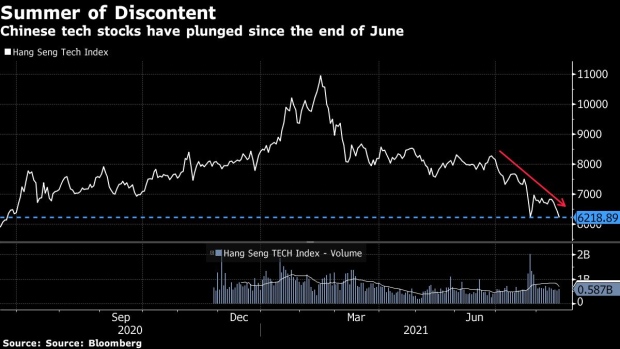Aug 17, 2021
Hedge Funds Blindsided by China Risk With Gensler Urging Caution
, Bloomberg News

(Bloomberg) -- Ray Dalio insists that the swings in Chinese markets are little more than “wiggles.” But for a certain subset of hedge-fund managers, the consequences of Beijing’s crackdown might seem more like an earthquake.
Philippe Laffont’s Coatue Management, Gabe Plotkin’s Melvin Capital Management and Andreas Halvorsen’s Viking Global Investors added new positions in Beijing-based JD.com Inc. in the second quarter, only to see its American depositary receipts tumble 19% since June 30.
Over at Rokos Capital Management, its biggest new stake in the three months through June was about $102 million of Alibaba Group Holding Ltd. Glenview Capital Management also added the company’s stock during the period. The Chinese behemoth’s shares have since plunged more than 20% and were the biggest point-drag Tuesday on the Hang Seng Tech Index, which is on a five-day losing streak and closed at the lowest since June 2020.
All told, 13F filings from recent days demonstrate that even some of the biggest and brightest money managers didn’t anticipate China’s sweeping crackdown on everything from large technology firms to for-profit tutoring companies. On Monday, U.S. Securities and Exchange Commission Chair Gary Gensler issued his most direct warning yet about the risks of investing in Chinese companies.
While some hedge funds got out in advance, others that have invested in China for years are grappling with a fundamental question: Is this just a blip, as Dalio suggests, or have Chinese ADRs become “uninvestable,” like Paul Marshall, co-founder of $59 billion investment firm Marshall Wace, said in a letter to clients last week?
For now, at least, not all hedge funds are willing to join Ark Investment Management’s Cathie Wood in taking their Chinese stock exposure to zero.
“It’s a mistake to believe that China is uninvestable,” said Cory Lester, managing director at Morgan Creek Capital Management, which has stakes in hedge funds, including some that invest in China. “The current environment is very much shoot first, ask questions later.”
The keys to investing in China are to be less concentrated and stay nimble to potential policy changes, he said in an interview.
In one example of the delicate balancing act, Laurion Capital Management, a 16-year-old hedge fund, increased its ownership in Alibaba, bringing the market value of its holding to almost $700 million at midyear and making it the firm’s largest position. Its biggest new buy was a $257 million stake in JD.com.
Yet the firm also disposed of some Chinese ADRs that it purchased in the first quarter, including Shopify Inc., Baidu Inc. and Vipshop Holdings Ltd. Those were the same stocks that were offloaded in massive blocks during the collapse of Bill Hwang’s Archegos Capital Management. All have tumbled since then.
Tiger Global Management may be a case study in navigating the cross-currents out of Beijing. Chase Coleman’s $65 billion firm, which has invested in China for two decades, has the most exposure to Chinese ADRs among hedge funds that disclose such holdings.
In the second quarter, Tiger Global added 22.5 million shares of Chinese cosmetics maker Yatsen Holding Ltd., making it the largest public holder. The ADRs dropped 24% in the three months through June and have plunged an additional 39% since then. Its $4.1 billion stake in JD.com remained its largest holding as of June 30.
Yet Tiger Global’s hedge fund slid less than 1% in July, likely mitigated by large stakes in U.S. technology companies such as Microsoft Corp. and Carvana Co.
That’s the kind of strategy that Dalio, founder of Bridgewater Associates, the world’s largest hedge fund, argued for in a July 30 LinkedIn post.
“The American and Chinese systems and markets both have opportunities and risks and are likely to compete with each other and diversify each other. Hence they both should be considered as important parts of one’s portfolio,” Dalio wrote. “Look at the trends and not misunderstand and over-focus on the wiggles.”
©2021 Bloomberg L.P.